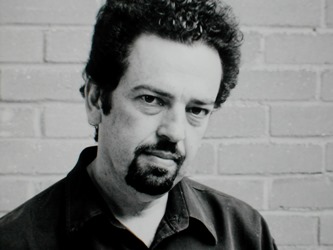Posted on March 26, 2014 by The Orwell Prize -

Jonathan Freedland is a columnist at the Guardian. He also regularly writes for the New York Review of Books and the Jewish Chronicle. He also presents ‘The Long View’ on Radio 4, and writes novels under the pseudonym Sam Bourne. He was shortlisted for the Orwell Prize for journalism in 2007.
Submitted Articles
Marking Margaret Thatcher’s passing: a battle over Britain’s present and future – The Guardian, 09/04/2013 Antisemitism doesn’t always come doing a Hitler salute – The Guardian, 04/10/2013 Why even atheists should be praying for Pope Francis – The Guardian, 15/11/2013 Woolwich attack: When killers strike, should we listen to what they say? – The Guardian, 24/05/2013 In Britain today rules, like taxes, are for the little people – The Guardian, 12/07/2013 The Unknown Maggie – The New York Review of Books, 26/09/2013
Posted on March 26, 2014 by The Orwell Prize -

Moscow 1945. As Stalin and his courtiers celebrate victory over Hitler, shots ring out. On a nearby bridge, a teenage boy and girl lie dead. But this is no ordinary tragedy and these are no ordinary teenagers, but the children of Russia’s most important leaders who attend the most exclusive school in Moscow. Is it murder? A suicide pact? Or a conspiracy against the state? Directed by Stalin himself, an investigation begins as children are arrested and forced to testify against their friends – and their parents. This terrifying witch-hunt soon unveils illicit love affairs and family secrets in a hidden world where the smallest mistakes will be punished with death. Taken from Random House
Posted on March 26, 2014 by The Orwell Prize -

Suzanne Moore is a columnist for the Guardian. She has previously written for the Daily Mail, the Independent, and the New Statesman.
Submitted articles
In the digital economy, we’ll soon all be working for free – and I refuse – The Guardian, 15/01/2014 The worship of children brings only misery – The Guardian, 23/10/2013 Grayson Perry’s tapestries, weaving class and taste – The Guardian, 08/06/2013 Don’t vilify Russell Brand – he’s right to demand the impossible – The Guardian, 06/11/2013 It’s hard not to be angry when men won’t discuss rape and abuse – The Guardian, 15/01/2013 Boris Johnson’s philosophy isn’t just elitist – it’s sinister – The Guardian, 28/11/2013 Suzanne Moore on twitter
Posted on March 26, 2014 by The Orwell Prize -
Posted on March 26, 2014 by The Orwell Prize -
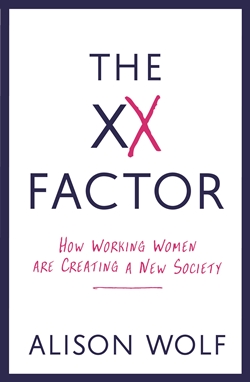
For most of history, being female defined the limits of a woman’s achievements. But now, women are successful careerists equal to men. In Norway, women legally must constitute a third of all boards; in America, women have gone from 3% of practising lawyers in 1970 to 40% today, and over half of all law students. These changes are revolutionary – but not universal: the ‘sisterhood’ of working women is deeply divided. Making enormous strides in the workplace are young, educated, full-time professionals who have put children on hold. But for a second group of women this is unattainable: instead, they work part-time, earn less, are concentrated in heavily feminised occupations like cleaning and gain income and self-worth from having children young. As these two groups move ever further apart, shared gender no longer automatically creates interests in common with other women. The XX Factor lifts the curtain on these social, cultural and economic schisms. Taken from Profile
Posted on March 20, 2013 by The Orwell Prize -
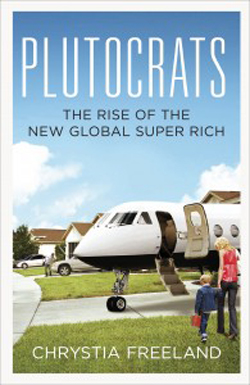
The rich really are different … There has always been some gap between rich and poor, but it has never been wider – and now the rich are getting wealthier at such breakneck speed that the middle classes are being squeezed out. While the wealthiest 10% of Americans, for example, receive half the nation’s income, the real money flows even higher up, in the top 0.1%. As a transglobal class of highly successful professionals, these self-made oligarchs often have more in common with one another than with their own countrymen. But how is this happening, and who are the people making it happen? Chrystia Freeland, acclaimed business journalist and Global Editor-at-Large of Reuters, has unprecedented access to the richest and most successful people on the planet, from Davos to Dubai, and dissects their lives with intelligence, empathy and objectivity. Pacily written and powerfully researched, Plutocrats could not provide a more timely insight into the current state of Capitalism and its most wealthy players. Taken from Penguin
Posted on March 20, 2013 by The Orwell Prize -

Christina Patterson is a writer, broadcaster and columnist. She writes about politics, society, culture, books and the arts. She has interviewed writers and artists ranging from Martin Amis to Eddie Izzard and Werner Herzog, and did the first interview after he left office with Gordon Brown. A former director of the Poetry Society, and literary programmer at the Southbank Centre, she has written for the Observer, the Sunday Times, the Guardian, Time, the Spectator and the New Statesman. She’s a regular commentator on radio and TV news programmes, a regular reviewer on the Sky News press preview, and a regularguest on cultural programmes including BBC 2′s The Review Show. She has also campaigned to improve standards in nursing in a series of articles in The Independent, by speaking at conferences, and in programmes she has made, including a documentary for Radio 4 and a film for The One Show. After 10 years on the staff of The Independent, she is now freelance.
Submitted articles
The nurses who taught an ailing hospital how to care A crisis in nursing: Six operations, six stays in hospital – and six first-hand experiences of the care that doesn’t care enough More nurses, better paid than ever – so why are standards going down? How can a profession whose raison d’être is caring attract so much criticism for its perceived callousness? Does nursing need to be managed differently? Or is the answer to develop a new culture of compassion? Reforms in the 1990s were supposed to make nursing care better. Instead, there’s a widely shared sense that this was how today’s compassion deficit began. How did we come to this? Anne Milton: ‘We need to raise the bar’
Other links
Christina Patterson on Twitter Christina Patterson on Journalisted
Posted on March 20, 2013 by The Orwell Prize -
Posted on March 20, 2013 by The Orwell Prize -

The past decade saw the rise of the British National Party, the country’s most successful ever far-right political movement, and the emergence of the anti-Islamic English Defence League. Taking aim at asylum seekers, Muslims, “enforced multiculturalism” and benefit “scroungers”, these groups have been working overtime to shift the blame for the nation’s ills onto the shoulders of the vulnerable. What does this extremist resurgence say about the state of modern Britain? Drawing on archival research and extensive interviews with key figures, such as BNP leader Nick Griffin, Daniel Trilling shows how previously marginal characters from a tiny neo-Nazi subculture successfully exploited tensions exacerbated by the fear of immigration, the War on Terror and steepening economic inequality. Mainstream politicians have consistently underestimated the far right in Britain while pursuing policies that give it the space to grow. Bloody Nasty People calls time on this complacency in an account that provides us with fresh insights into the dynamics of political extremism. Taken from Verso Books
Posted on March 20, 2013 by The Orwell Prize -

Clare Sambrook is a freelance, and a current contributor to openDemocracy, Private Eye and The Guardian. In 2010 Clare won both the Paul Foot Award and the Bevins Prize for outstanding investigative journalism for her work exposing government attempts to mislead Parliament and the public about the forcible arrest and detention of asylum-seeking families. With six friends she co-founded the citizens’ campaign End Child Detention Now. Her acclaimed debut novel, Hide & Seek, came out in more than a dozen languages in 2005, becoming a New York Times editor’s choice and a Daily Mail book club selection.
Submitted articles
The UK Border Agency’s long, punitive campaign against children (helped by G4S and Serco) How many children secretly deported under UK Border Agency’s Gentleman’s Agreement? UK policymaking outsourced: the curious case of adoption reform Corporate Power stamps its brand on British Policing Who should investigate murder — the police, or a private security company? A child, a bleeding anus, interrogation by the UK Border Agency
Other links
Clare Sambrook on Twitter
Posted on March 20, 2013 by The Orwell Prize -

The world has watched, stunned, the bloodshed in Mexico. Forty thousand murdered since 2006; police chiefs shot within hours of taking office; mass graves comparable to those of civil wars; car bombs shattering storefronts; headless corpses heaped in town squares. And it is all because a few Americans are getting high. Or is it part of a worldwide shadow economy that threatens Mexico’s democracy? The United States throws Black Hawk helicopters, DEA assistance, and lots of money at the problem. But in secret, Washington is at a loss. Who are these mysterious figures who threaten Mexico’s democracy? What is El Narco?
El Narco is not a gang; it is a movement and an industry drawing in hundreds of thousands, from bullet-riddled barrios to marijuana-covered mountains. The conflict spawned by El Narco has given rise to paramilitary death squads battling from Guatemala to the Texas border (and sometimes beyond). In this “propulsive … high-octane” book (Publishers Weekly), Ioan Grillo draws the first definitive portrait of Mexico’s cartels and how they have radically transformed in the past decade. Taken from Bloomsbury
Posted on March 20, 2013 by The Orwell Prize -

David Gardner is the FT‘s international affairs editor and author of Last Chance: The Middle East in the Balance. He was the paper’s Middle East editor from 1995-99. In 2003 he won the David Watt prize for political journalism for his writing on the Arab world.
Submitted articles
The seismic tussles that will shape the Middle East Lebanon can overcome its divisions to deter Syria Assads regime is finished do not mourn its passing Febrile and fragmented Hollow victory Autonomy under fire
Posted on March 20, 2013 by The Orwell Prize -
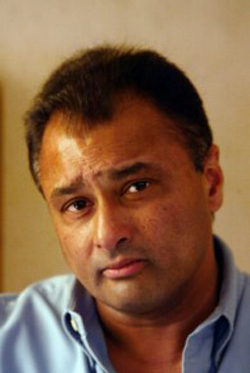
Kim Sengupta is the Defence and Diplomatic Correspondent of The Independent. He covers international and domestic news and his extensive reporting from around the world has included many of the major conflicts in recent times.
Submitted articles
Other links
Kim Sengupta on Journalisted
Posted on March 20, 2013 by The Orwell Prize -
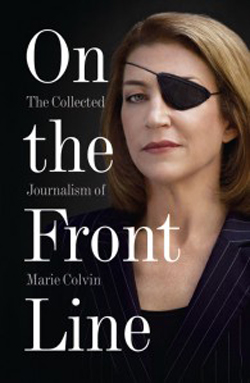
A fearless, passionate veteran reporter of conflicts from around the world, Sunday Times journalist Marie Colvin was killed in February 2012, covering the uprising in Syria from the besieged city of Homs. On the Front Line is a collection of her finest work, a portion of the proceeds from which will go to the Marie Colvin Memorial Fund. Marie Colvin held a profound belief in the pursuit of truth, and the courage and humanity of her work was deeply admired. On the Front Line includes her various interviews with Yasser Arafat and Colonel Gadaffi; reports from East Timor in 1999 where she shamed the UN into protecting its refugees; accounts of her terrifying escape from the Russian army in Chechnya; and reports from the strongholds of the Sri Lankan Tamil Tigers where she was hit by shrapnel, leaving her blind in one eye. Typically, however, her new eye-patch only reinforced Colvin’s sense of humour and selfless conviction. She returned quickly to the front line, reporting on 9/11, Afghanistan, Iraq, Gaza and, lately, the Arab Spring. Immediate and compelling, On the Front Line is a street-view of the historic events that have shaped the last 25 years, from an award-winning foreign correspondent and the outstanding journalist of her generation. Taken from HarperCollins
Posted on March 20, 2013 by The Orwell Prize -

Paul joined the BBC in 2001, making his first live appearance on the day of 9/11. He covered the corporate scandals that followed: Enron and Worldcom. His groundbreaking reports on the rise of China as an economic power won him the Wincott Award in 2003. He has covered stories as diverse as Hurricane Katrina, gang violence on Merseyside, the social impact of mobile phones in Africa and the rise of Aymara nationalism in Bolivia. Paul was one of the BBC’s first bloggers and has twice been nominated for the Orwell Prize. He covered the collapse of Lehman Brothers live from outside its New York HQ and, “has hardly stopped for breath since then”, reporting on the social and economic impact of the global meltdown from the mean streets of Gary, Indiana to the elite salons of Davos. Born in Leigh, Greater Manchester, in 1960 he studied music and politics at Sheffield University, switching to journalism in the early 1990s. He is the author of two books: Live Working or Die Fighting, How the working class went global; and Meltdown: The end of the age of greed. Taken from the BBC
Submitted articles
Love or nothing: The real Greek parallel with Weimar Timon of Athens: the power of money Spain: Simmering anger in Seville The growing demand for food banks in breadline Britain Behold, the British establishment, panicked Abortion is key US political flashpoint as laws tighten
Other links
Paul Mason on Twitter Paul Mason on Journalisted
Posted on March 20, 2013 by The Orwell Prize -

Andrew Norfolk is The Times journalist instrumental in breaking the Rotherham grooming scandal. He recently won the Paul Foot Award for investigative journalism.
Submitted articles
Other links
Posted on March 20, 2013 by The Orwell Prize -

It is often the smallest details of daily life that tell us the most. And so it is under occupation in Palestine. What most of us take for granted has to be carefully thought about and planned for: When will the post be allowed to get through? Will there be enough water for the bath tonight? How shall I get rid of the rubbish collecting outside? How much time should I allow for the journey to visit my cousin, going through checkpoints? And big questions too: Is working with left-wing Israelis collaborating or not? What affect will the Arab Spring have on the future of Palestine? What can anyone do to bring about change? Are any of life’s pleasures untouched by politics? Taken from Profile Books
Posted on March 20, 2013 by The Orwell Prize -



